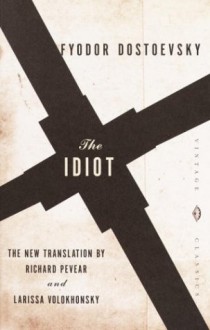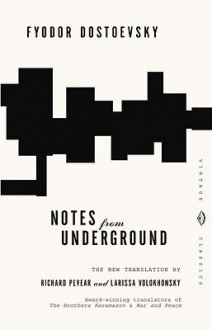
Now that I’ve reached the end of Fyodor Dostoevsky’s The Idiot (this edition translated by Richard Pevear and Larissa Volokhonsky) I have begun to see it as the story of a man scandalized by a world that disappoints nearly every effort at goodness. A man, the prince and maybe the author, who, having ventured into the world, extended sympathy out to the people he saw but has been broken by them and retreated to a shell of conservatism and safety.
The (relatively brief) synopsis: A young man of the Russian aristocratic class, Prince Lev Nikoláevich Mýshkin, arrives in St. Petersberg after having been raised in Switzerland where he was treated for what we assume is epilepsy. It’s told that he has seizures and was an “idiot” as well, mute and developmentally challenged as a child from the sounds of it. Arriving back in Russia he becomes known for extending sympathy and withholding judgement and for this naivete the label follows him throughout the novel as a term of abuse. He encounters several groups of people his first day back that become the basis of his social circle in Russia. Among these, a rich merchant Rogózhin, who is bullish and immediate in pursuing his desires, the Epanchin family that serves as a sort of “straight man” (or family) tumbled about by these external forces, the Ívolgin family, and Nastásya Filíppovna, a beautiful young woman who has been sexually abused by an adopted father-figure and has grown to be a troubled figure who tends to sow chaos.
Driving the story along is a tortured love triangle between the prince, Rogózhin and Nastásya Filíppovna, with Agláya Epanchin, the youngest and most beautiful of three Epanchin daughters, eventually being thrown into the mix.
This is all hardly a skeleton of this 610 page story and if I had one piece of advice to impart before reading this book it would be to remember that it was published serially and to view it more like a television series than today’s more plot-driven novels. Chapters, much like episodes, are little stories within themselves that involve our main characters but often do not move the main story arch forward, much like a sitcom that weaves tidbits of larger romantic plots into the self-contained 30 minute adventures.
So if you find yourself wondering how a 20 page reading of the suicide note of the prince's consumptive neighbor ties into these primary goals, it doesn’t really, but not everything has to. Much of it is a way to imagine the simple, kind prince into contemporary — for its time — debates and conversations, which can make it feel dated. But while the specifics have changed, the conversations never change that much: faith, government, sexual mores, frivolous lawsuits, and stab-happy rival suitors.
The prince handles himself well in many circumstances, though is often scoffed at for some reason not necessarily related to the argument. But stepping back now and taking the novel as a whole, especially the ending, the story leaves a rather bleak impression.
If you are one to read the introduction or footnotes you should be tipped off by the association between this book and “Christ’s Body in the Tomb,” a painting by Hans Holbein depicting a gruesomely realistic dead body about which the prince says, “A man could even lose his faith from that painting!” Dostoevsky seems interested in what it would take to do just that.
The sensitive characters of this story: the prince, Nastásya, even Aglya and Ippolit, get ground down by the world they encounter. It’s a world they wish to embrace but one that is full of awful people and acts, where goodness is nigh impossible. While those who thrive in this story are the savvy and amoral. They are practical folks like Iván Fyódorovich Epanchin or cynical like Gavríla Ardaliónovich, Lebedev and Evgény Pávlovich.
Rogózhin seems a special case to me, too sensitive to be practical but certainly not sympathetic. In the end, he too gets broken down but he recovers mentally if not financially. He lives in a passion for the now and these can bring him as far as the breaking point but he is not introspective and doesn't really care for others so he is not haunted by the deaths and misfortunes of others. Nastásya proves almost too much for him and drives him to a sort of ruin for him though he lives and even recovers his wits. He chases a desire, lets it consume him even to disaster, but he picks himself up, dusts off his shoulders and runs headlong into the next disaster.
I don’t know how soon I could read this again after the couple months I spent in this world, but I would be interested to. Dostoevsky uses many long monogoues broken up only with brief descriptions of tone or intention in the character that more often confused me than enlightened. I wouldn't be surprised if whole scenes turned on a new impression of how Aglaya, Varvára Ardaliónovich, Gavríla, and others spoke or bore themselves in these conversations if I were to read them again with foreknowledge and in a different mood. Were they mocking or playful, obtuse or merely cautioned.
Lizavéta Prokófyevna Epanchin (Aglaya’s mother) may be the most fascinating character to revisit as she is in so much of the book and may be the most dynamic character. Lizavéta is drawn strongly to the prince and seems fascinated by him, is dedicated to being his friend, but at times it seems she is ready to throw him over for his lack of social savvy and too forgiving nature. Aglaya too acts and speak in a way that confounded me often and as she became a love interest I wondered if her feelings was genuine or cruel or something else.
This confusion may stem from many things, the author’s intention, different understandings of the world over 100 years apart, but leading them is a narrator whose role wasn’t entirely clear. Dostoevsky, like Charles Dickins in A Christmas Carol, let the narrator fade in and out of the story and gave them unclear powers. The narrator is not a named character, but is self-aware. They break the fourth wall, referencing what we know or can know and even expressing difficulty in describing characters or situations. They seem omniscient, recounting private goings on and the inner thoughts and motivations of various characters, but then at moments take up a voice and explain why they do or do not know the content of some conversation or event. One story came through some reliable gossips in town and seemed the most likely version of the story, another was recounted in testimony or written in a letter. At one point the narrator says they can’t know what was said in a private conversation though just pages before they write word-for-word a long private discussion between the prince and Nastásya.
It can frustrating in its inconsistency, but I’m being generous and will take for granted that Dostoevsky was using the uncertain narrator to heighten moments when other characters are kept in the dark. When our protagonist is trying to learn something, when the author wants to build tension for a reveal by leaking that something is coming but making you read through to discover what it is.
If you’re a fan of Russian literature I hardly need to encourage you to pick up a Dostoevsky novel but if you’re not I’m not sure this is the best introduction. The best I can offer is that it is very much of the 19th century, and if you enjoy society types such as Henry James, I think you’ll find much to like in The Idiot, only a lot more of it and perhaps a bit more philosophical. Don’t treat it as a race to the finish and allow that this novel could take a while. But overall expect a thought provoking and often moving story.

 Log in with Facebook
Log in with Facebook 









